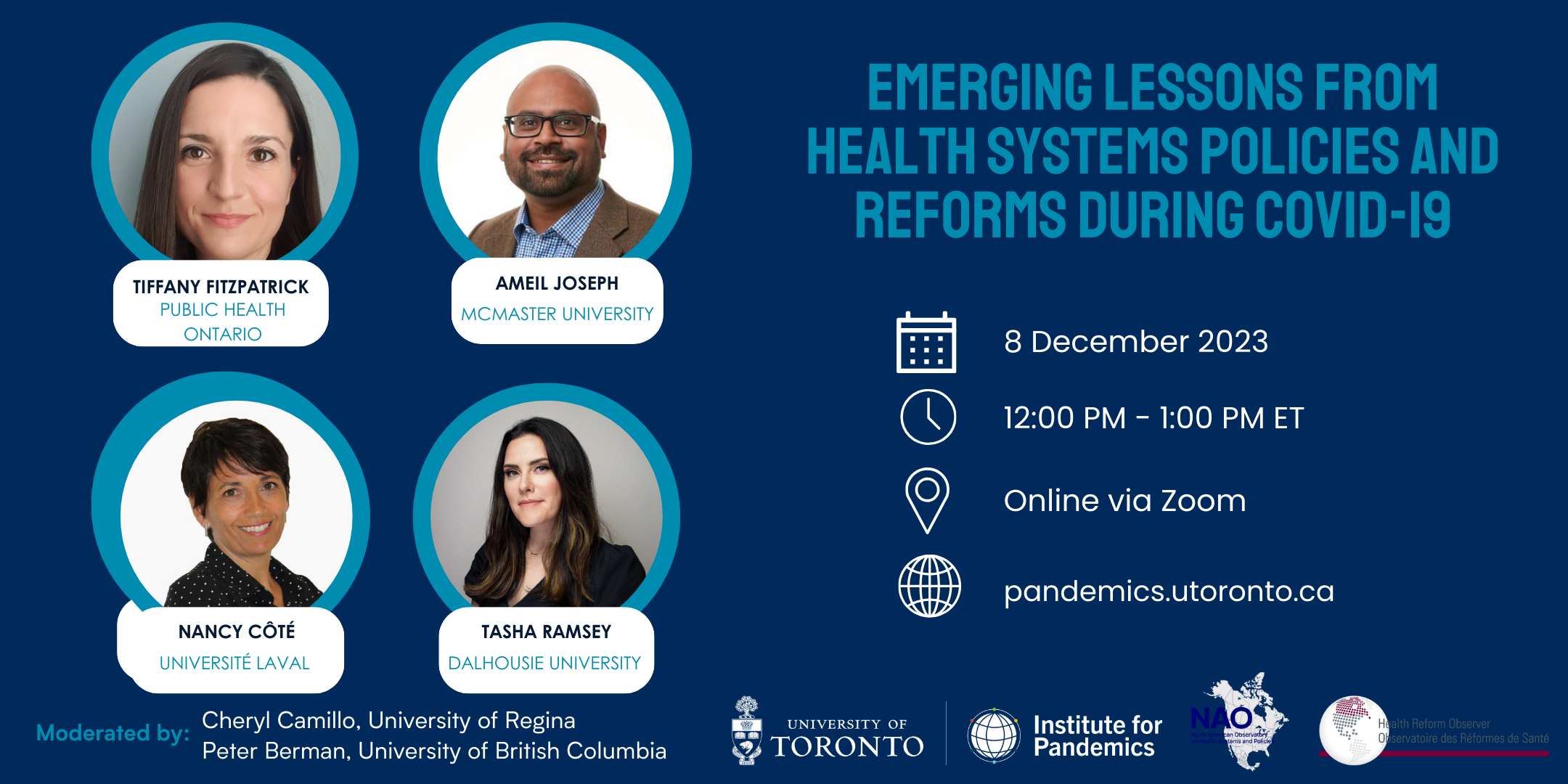
Emerging lessons from health systems policies and reforms during COVID-19
Join the Institute for Pandemics, the North American Observatory on Health Systems and Policies, and Health Reform Observer for a webinar to launch the “Special Issue: COVID-19 Pandemic Policies and Systems Reforms.”
As health systems and societies worldwide continue to deal with COVID-19 while also planning for recovery and rebuilding, there is much to be learned from the rapid pace and scale of policy change in Canada in response to the pandemic. This special issue documents experiences, successes, and failures of health systems reforms and policy responses during the pandemic, leveraging the variations that were seen across the country in the nature, timing, and responses to the evolving pandemic.
This webinar featured presentations from the authors of select papers in the journal and was moderated by Professors Cheryl Camillo and Peter Berman.
About the moderators
Cheryl Camillo is a scholar-practitioner with 30 years experience shaping successful solutions to real-world health and social policy and governance problems. During her career, she has served in most roles of the public policymaking process, including as federal technical director, state public health insurance program director, and policy researcher and program evaluator. She came to Canada in 2015 as a Fulbright Fellow to conduct mixed methods comparative health policy and systems research focusing on Canada and the United States. She is an Associate Professor at the Johnson Shoyama Graduate School of Public Policy at the University of Regina where she teaches Health Policy and Social Policy in the school's Master of Health Administration, Public Policy, and Public Administration programs. Dr. Camillo’s interdisciplinary training informs her work-she holds a BA in Political Science (comparative political systems concentration) from Yale University, a Master of Public Administration degree from the Maxwell School of Citizenship and Public Affairs at Syracuse University, and a PhD in Public Policy (health policy concentration) from the University of Maryland, Baltimore County. Since 2021, she has served as Deputy Lead for the CIHR-funded Coronavirus Variants Rapid Response Network's (CoVaRR-Net's) Public Health, Health Systems, and Social Policy Impacts pillar, where she leads research documenting and analyzing Canada's provincial and territorial COVID-19 vaccination campaigns.

Peter Berman (M.Sc, Ph.D) is a health economist with almost fifty years of experience in research, policy analysis and development, and training and education in global health. He became Professor Emeritus of Population and Public Health at the School of Population and Public Health, University of British Columbia in Vancouver Canada in January 2023 where he had previously been Professor and Director from 2019-21. He is also currently Adjunct Professor of Global Health at Harvard T. H. Chan School of Public Health, Harvard University, where he was on faculty for several decades, lastly as Professor until 2019. His current research at UBC focuses on key factors affecting government decision-making in response to public health crises (see www.governhealth.ca ). He has also been closely engaged in health systems research in Ethiopia since 2012 (see www.fenotproject.com and https://www.hsph.harvard.edu/health-financing/ )

About the presenters
Sara Allin is an Assistant Professor at the Institute of Health Policy, Management and Evaluation at the University of Toronto, and Director of Operations of the North American Observatory on Health Systems and Policies. Prof. Allin conducts research that aims to improve health system performance, and comparative studies across provinces/territories and internationally in health care and public health. She founded the North American COVID-19 Monitor to systematically document the public health, health system and economic policies introduced in response to the COVID-19 pandemic in Canada, its provinces and territories, and the United States and Mexico.

Tiffany Fitzpatrick, PhD MPH, is a Scientist at Public Health Ontario, Assistant Professor in the Division of Epidemiology at the University of Toronto’s Dalla Lana School of Public Health, and Adjunct Scientist at ICES. In addition to being a member of the University of Toronto’s Center for Vaccine Preventable Diseases, she also serves on the Executive Board of the Canadian Association for Immunization Research, Evaluation and Education (CAIRE). Dr. Fitzpatrick’s research program primarily focuses on the surveillance, epidemiology, and modeling of viral respiratory infections in pediatric populations, such as respiratory syncytial virus (RSV) and COVID-19, with an emphasis on informing population-based prevention programs and policies with the aim of reducing social inequities in child health.

Ameil Joseph is an Associate Professor in the School of Social Work at McMaster University. Ameil currently holds a Professorship in Equity, Identity, and Transformation from the Faculty of Social Sciences at McMaster University and is the Academic Director of Community-Engaged Research & Relationship with the Office of Community Engagement, also at McMaster University. He draws on perspectives of critical forensic mental health, mad studies, postcolonial theory, critical race theory, and critical disability studies to analyze the historical production of ideas about difference, normalcy, sexuality, eugenics, race, ability and mental “illness” as they cohere, diverge, interdepend, and perform within policy, law and practice. Ameil has presented and advocated across Canada, in the US and in Europe on issues related to racism, critical mental health and social justice. Ameil has over a decade of experience in the mental health field in areas of assertive community treatment, community-based early intervention, supportive housing, crisis respite, and governance settings.

Nancy Côté is an Associate Professor in the Department of Sociology at Université Laval. She holds the Canada Research Chair in the Sociology of Work and Healthcare Organizations, and is a member of VITAM, a sustainable health research center where she is co-leader of the research theme: Environments: living environments, work environments and care environments (including regional and rural). Her work is at the crossroads of the sociology of work, professions, and organizations. Her research focuses on the transformations of healthcare organizations and their effects on the work of professionals and managers in this sector. She is particularly interested in innovations in primary care and social services, such as governance and leadership, new modes of collaboration and redefinition of professional roles. She has developed an expertise in research conducted in partnership with healthcare organizations.

Tasha Ramsey obtained her Bachelor of Science in Pharmacy degree in 2008 from Dalhousie University, her Pharmacy Residency diploma in 2009 from Kingston General Hospital and the University of Toronto, and her Post-Graduate Doctor of Pharmacy degree in 2013 from the University of British Columbia.
Tasha is the Emerging and Re-Emerging Infections Clinical Therapeutics and Prophylactics Lead for Nova Scotia Health and an Assistant Professor at Dalhousie University’s College of Pharmacy. She is a member of the Nova Scotia Emerging and Re-emerging Infections Network and co-chair of the Nova Scotia Emerging and Re-emerging Infections Therapeutics and Prophylactics Recommendation Group.

